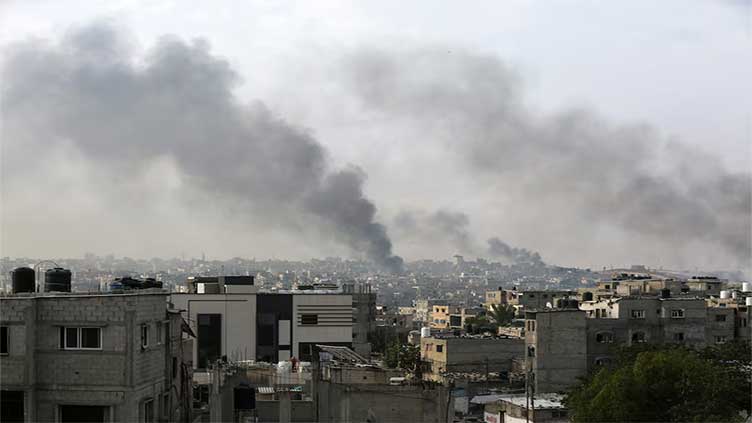Tanks reach Rafah's centre as Israel presses assault

World
Witnesses said the Israeli military appeared to have brought in remote-operated armoured vehicles
CAIRO (Reuters) – Israeli tanks reached the centre of Rafah for the first time on Tuesday, witnesses said, three weeks into a ground operation in the southern Gaza city that has sparked global condemnation.
The tanks were spotted near Al-Awda mosque, a central Rafah landmark, the witnesses told Reuters. The Israeli military said its forces continued to operate in the Rafah area without commenting on reported advancements into the city centre.
Overnight, its forces pounded the city with airstrikes and tank fire, residents said, pressing its offensive despite an international outcry over an attack on Sunday that sparked a blaze in a tent camp, killing at least 45 Palestinians, more than half of them children, women and the elderly.
Since that strike, at least 26 more people have been killed by Israeli fire in Rafah, officials in the enclave run by Hamas militants said.
Israeli tanks pushed towards western neighbourhoods and took positions on the Zurub hilltop in western Rafah in one of the worst nights of bombardment reported by residents. On Tuesday, witnesses reported gunbattles between Israeli troops and Hamas-led fighters in the Zurub area.
Witnesses in Rafah said the Israeli military appeared to have brought in remote-operated armoured vehicles and there was no immediate sign of personnel in or around them. An Israeli military spokesperson had no immediate response.
Since Israel launched its incursion by taking control of the border crossing with Egypt three weeks ago, tanks had probed around the edges of Rafah and entered some of its eastern districts but had not yet entered the city in full force.
Reacting to Sunday night's attack in a camp where families displaced from assaults elsewhere in Gaza had sought shelter, global leaders urged the implementation of a World Court order to halt Israel's assault.
Residents said the Tel Al-Sultan area, the scene of Sunday's deadly strike, was still being heavily bombarded.
"Tank shells are falling everywhere in Tel Al-Sultan. Many families have fled their houses in western Rafah under fire throughout the night," one resident told Reuters over a chat app.
ONE MILLION FLEE RAFAH
Around one million people have fled the Israeli offensive in Rafah since early May, the UN agency for Palestinian refugees (UNRWA) reported on Tuesday.
Israel has kept up attacks despite a ruling by the top UN court on Friday ordering it to stop, arguing that the court's ruling grants it some scope for military action there.
Since early May, Israel's military has been carrying out what it says is a limited operation in Rafah to kill fighters and dismantle infrastructure used by Hamas, which runs Gaza. It has told civilians to go to an "expanded humanitarian zone" some 20 km (12 miles) away.
Many Palestinians have complained they are vulnerable to Israeli attacks wherever they go and have been moving up and down the Gaza Strip in the past few months.
UNRWA said the flight from Rafah "happened with nowhere safe to go and amidst bombardments, lack of food and water, piles of waste and unsuitable living conditions."
Providing assistance and protection is becoming nearly "impossible", the agency said.
More than 36,000 Palestinians have been killed in Israel's offensive, Gaza's health ministry says. Israel launched the operation after Hamas-led militants attacked southern Israeli communities on Oct. 7, killing around 1,200 people and seizing more than 250 hostages, according to Israeli tallies.
Israel says it wants to root out Hamas fighters holed up in Rafah and rescue hostages it says are being held in the area.


